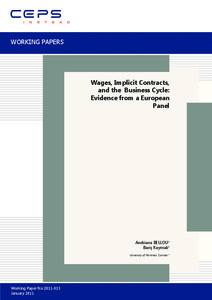Wages, implicit contracts, and the business cycle: evidence from a European panel
"This paper examines the cyclical behavior of hours and wages in a unique panel of 11 European countries, and documents signi?cant history dependence in wages. Workers who experience favorable market conditions during their tenure on the job, have higher wages, and work fewer labor hours. Unobs...
| Main Authors: | , , |
|---|---|
| Institution: | ETUI-European Trade Union Institute |
| Format: | TEXT |
| Language: | English |
| Published: |
Differdange
2011
CEPS-INSTEAD |
| Subjects: | |
| Online Access: | https://www.labourline.org/KENTIKA-19182653124919008359-Wages,-implicit-contracts,-and.htm |
| Summary: | "This paper examines the cyclical behavior of hours and wages in a unique panel of 11 European countries, and documents signi?cant history dependence in wages. Workers who experience favorable market conditions during their tenure on the job, have higher wages, and work fewer labor hours. Unobserved differences in productivity, such as varying job quality, or match-speci?c productivity are not likely to explain this variation. The results instead point to the importance of contractual arrangements in wage determination. In economies with decentralized bargaining practices, such arrangements resemble self-enforcing insurance contracts with onesided commitment (by the employer). On the other hand, in countries with strong unions and centralized wage bargaining, wage behavior is better approximated by full-commitment insurance contracts." |
|---|---|
| Physical Description: | 25 p. Digital |

